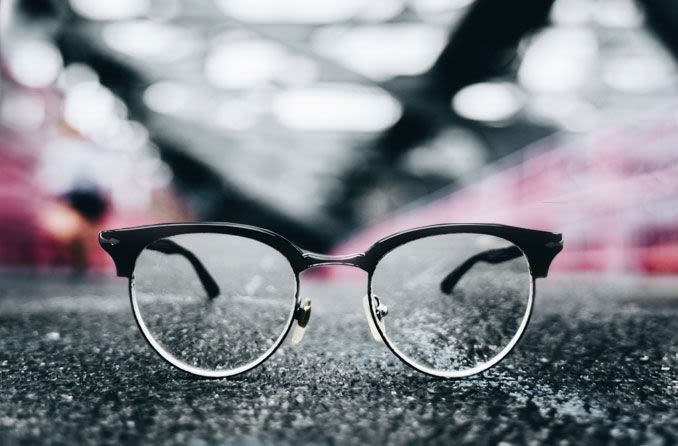How to find durable men’s eyeglasses

It happens to all guys. Plastic frames snap when you take an elbow to the face during a pickup basketball game. Lenses get scratched when you drop your eyeglasses and accidentally kick them skidding across the factory floor.
The trouble is, when your eyeglasses get twisted, scratched or mangled, you need a fix now. You can’t wait to buy new ones when you see the optometrist in a year or so.
If you’re in the market for rugged, durable eyeglasses, you have to think about the materials in your frames and lenses. Let’s walk through each:
The most durable eyeglass frames

Your choices boil down to plastic or metal. Some frames combine metal and plastic, but that’s more of a fashion convention than a durability boost.
Isn’t metal inherently tougher than plastic? Perhaps, but everything depends on how you use your eyeglasses. These eyeglasses frames facts from the American Optometric Association will clear things up:
Metal frame materials

When choosing metal frames, consider the combination of weight, flexibility, strength and resistance to breakage. If you have metals allergies, make sure your frame material is hypoallergenic.
Here is a closer look at metal frame materials:
Flexon: This brand-name metal has a unique capability for springing back to its original shape after it gets twisted. You may see it called “memory metal.”
Titanium: A lightweight metal that doesn’t rust, titanium has lots of fans in the eyeglasses world. Though strong and flexible, titanium can be pricier than other metals. Pure titanium is hypoallergenic.
Stainless steel: The temples of stainless-steel frames have some spring in them, which resists breakage. Stainless steel also resists corrosion, giving it a longer life. It may be hypoallergenic, depending on the alloys used.
Less desirable metals: Monel, one of the most common frame metals, is strong and durable, but it can trigger reactions in people allergic to nickel. Cobalt is lightweight, durable and flexible, but it’s also quite expensive. Aluminum frames are lightweight and attractive, but they’re also stiff, brittle and prone to snapping.
Plastic frame materials

Plastic frames are attractive, inexpensive and fashionable. They also tend to weaken with age and can even melt or catch fire. Some plastics trigger allergies, so make sure to check the materials in your plastic frames if you’re prone to allergic reactions.
Here is a closer look at plastic frames materials:
Nylon: Athletes and people in hazardous professions often prefer nylon frames because they are flexible, lightweight and all but unbreakable — at least in the short run. Nylon frames can become brittle over time, which is something to think about.
Kevlar: This material used in bulletproof vests can survive strong impacts, making it a good choice for contact sports and high-risk jobs. It doesn’t have a lot of flex, however, which limits its applications.
Less desirable plastics: Cellulose acetate (zylonite), one of the most common eyeglass frame plastics, is inexpensive and flexible, but may become brittle over time. Optyl is lightweight and hypoallergenic but prone to breakage under some circumstances.
READY TO SHOP FOR FRAMES? Find an optical store near you or shop online.
The most durable eyeglass lenses

Your lenses are arguably more important than frames because they correct your vision and protect your eyesight. Durable eyeglass lenses must resist scratches and hold together on impact.
Here’s a closer look at durable eyeglasses lens materials:
Polycarbonate: This soft, sturdy plastic does not shatter on impact, making it one of the best choices for safety lens applications. Polycarbonate lenses also work well with rimless eyeglass designs.
Trivex: The lightest lens material on the market, Trivex has an impact resistance similar to polycarbonate. The optics, however, can outperform polycarbonate for some people.
Tribrid: Thin, lightweight and impact-resistant, Tribrid is another durable plastic material. Unfortunately, it’s not widely available.
SEE RELATED: A helpful guide to men's glasses
Anti-scratch lens coatings
Polycarbonate and Trivex are soft plastics that flex or bend to prevent shattering. This is excellent for your eyes, but not so great for the lens surface, which can scratch easily.
Therefore, you need to make sure your plastic lenses are treated to resist scratching. Some eyeglasses retailers also offer an optional warranty for scratched lenses.
What about glass lenses?

Glass is a much harder surface than plastic. Because glass lenses resist scratching, they can last much longer than plastic ones.
But that’s not the same as durability — which means staying useful over the long haul.
Unfortunately, glass lenses tend to break on impact, rendering them useless. Moreover, if you’re wearing them when they break, you can suffer severe eye damage including permanent blindness.
Durable eyeglasses keep working across months or years of twists, turns and collisions. Glass lenses don’t fit that definition of durability.
The best path to durable men’s eyeglasses

Selecting the most durable eyeglass frames is a complicated business because you also have to think about fit, fashion and the individual quirks of your physiology.
Your eyesight may require a specific kind of lens that isn’t the most durable. You may be allergic to the materials in eyeglass frames, whether they are plastic or metal.
If you play impact sports, tough nylon frames may be the best choice. If you work in a petrochemical refinery, you might be better off with metallic frames.
When you select eyeglasses, make sure your optician understands your lifestyle — if you work hard and play harder, you need the most durable eyeglasses you can get.
However, if you work in an office and would rather read books than climb mountains, you could end up buying more durability than you actually need.
Whatever you decide, make sure it’s the safest, sanest choice for your vision.
READY FOR MORE DURABLE GLASSES? Find an optical shop near you.
Page published on Wednesday, September 18, 2019






